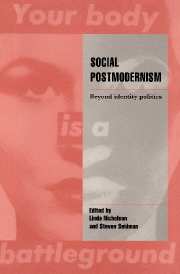Book contents
- Frontmatter
- Contents
- Notes on contributors
- Acknowledgements
- Introduction
- Part I Critiques of identity
- 1 Interpreting gender
- 2 Feminist encounters: locating the politics of experience
- 3 Postcolonial criticism and Indian historiography
- Part II Critiques of the deconstruction of identity
- Part III Postmodern approaches to the social
- Part IV Postmodern approaches to the political
3 - Postcolonial criticism and Indian historiography
Published online by Cambridge University Press: 29 October 2009
- Frontmatter
- Contents
- Notes on contributors
- Acknowledgements
- Introduction
- Part I Critiques of identity
- 1 Interpreting gender
- 2 Feminist encounters: locating the politics of experience
- 3 Postcolonial criticism and Indian historiography
- Part II Critiques of the deconstruction of identity
- Part III Postmodern approaches to the social
- Part IV Postmodern approaches to the political
Summary
One of the distinct effects of the recent emergence of postcolonial criticism has been to force a radical rethinking and reformulation of forms of knowledge and social identities authored and authorized by colonialism and Western domination. For this reason, it has also created a ferment in the field of knowledge. This is not to say that colonialism and its legacies remained unquestioned until recently: nationalism and Marxism come immediately to mind as powerful challenges to colonialism. But both of these operated with master-narratives that put Europe at its center. Thus, when nationalism, reversing Orientalist thought, attributed agency and history to the subjected nation, it also staked a claim to the order of Reason and Progress instituted by colonialism; and when Marxists pilloried colonialism, their criticism was framed by a universalist mode-of-production narrative. Recent postcolonial criticism, on the other hand, seeks to undo the Eurocentrism produced by the institution of the West's trajectory, its appropriation of the other as History. It does so, however, with the acute realization that postcoloniality is not born and nurtured in a panoptic distance from history. The postcolonial exists as an aftermath, as an after – after being worked over by colonialism. Criticism formed in this process of the enunciation of discourses of domination occupies a space that is neither inside nor outside the history of Western domination but in a tangential relation to it. This is what Homi Bhabha (1989) calls an in-between, hybrid position of practice and negotiation, or what Gayatri Chakravorty Spivak (1990) terms catachresis; “reversing, displacing, and seizing the apparatus of value-coding.”
- Type
- Chapter
- Information
- Social PostmodernismBeyond Identity Politics, pp. 87 - 100Publisher: Cambridge University PressPrint publication year: 1995
- 7
- Cited by

